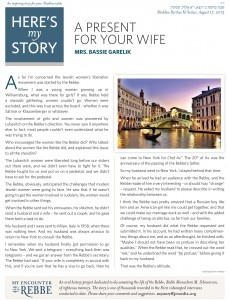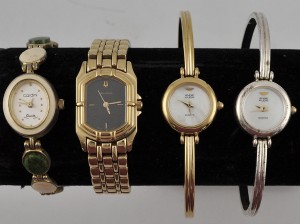HMS: A Present for your wife
As far I’m concerned the Jewish women’s liberation movement was started by the Rebbe.
When I was a young woman growing up in Williamsburg, what was there for girls? If any Rebbe held a chassidic gathering, women couldn’t go. Women were excluded, and this was true across the board – whether it was Satmar or Klausenberger or whatever.
The involvement of girls and women was pioneered by Lubavitch on the Rebbe’s direction. You never saw it anywhere else. In fact, most people couldn’t even understand what he was trying to do.
Who encouraged the women like the Rebbe did? Who talked about the women like the Rebbe did, and explained this issue to all the chasidim?
The Lubavitch women were liberated long before our sisters out there were, and we didn’t even have to fight for it. The Rebbe fought for us and put us on a pedestal, and we didn’t have to ask for the pedestal.
The Rebbe, obviously, anticipated the challenges that modern Jewish women were going to face. He saw that if he wasn’t going to get the women involved in Judaism, the women would get involved in other things.
When the Rebbe sent out his emissaries, his shluchim, he didn’t send a husband and a wife – he sent out a couple, and he gave them both a task to do.My husband and I were sent to Milan, Italy in 1958, when there was nothing here. And my husband was always anxious to return to New York to consult the Rebbe.
I remember when my husband finally got permission to go to New York. We sent a telegram – everything back then was telegrams – and we got an answer from the Rebbe’s secretary. The Rebbe had said, “If your wife is completely in accord with this, and if you’re sure that he has a visa to go back, then he can come to New York for Chof Av.” The 20th of Av was the anniversary of the passing of the Rebbe’s father.
So my husband went to New York. I stayed behind that time.
When he arrived he had an audience with the Rebbe, and the Rebbe made of him a very interesting – or should I say “strange” – request. He asked my husband to please describe in writing the relationship between us.
I think the Rebbe was pretty amazed that a Russian boy like him and an American girl like me could get together, and that we could make our marriage work so well – and with the added challenge of being on shlichus, so far from our families.
Of course, my husband did what the Rebbe requested and submitted it. In his account, he had written many complimentary things about me, and as an afterthought, he finished with, “Maybe I should not have been so profuse in describing her qualities.” When the Rebbe read that, he crossed out the word “not,” and he underlined the word “be profuse,” before giving it back to my husband.
That was the Rebbe’s attitude.
And then came the story of my present.
Before my husband was to return home, he decided to bring me some baked goods, knowing how much I love to snack and that I was deprived because, at that time, there was no such thing as a kosher bakery here in Milan. So he went to Lowen’s Bakery on Kingston Avenue and he bought me cream cakes, the ones he knew I liked.
Later, Rabbi Hodakov, the Rebbe’s chief of staff, asked him, “Are you bringing your wife a present?”
He said, “Yes.”
“What are you bringing her?”
“I’m bringing her cakes.”
Rabbi Hodakov said, “The cakes she should enjoy, but that’s not a present, you really should get her something of gold.”
They settled that he should get me a watch. Rabbi Simpson – who was starting in the jewelry business then – came by with a selection of watches. My husband, Rabbi Hodakov, and Rabbi Groner, if I am not mistaken, were there, and they began to debate which watch was best. At some point, Rabbi Hodakov picked up all the watches and went to ask the Rebbe’s opinion on the matter.
The Rebbe said, “If there is time, use the face of this watch with the band of this one. If there’s no time, then it should be this watch.”
Then the Rebbe took out a prayer book for Rosh Hashanah and Yom Kippur which had just been published, and said, “And this is my present to her…”
Many, many years passed until I told this story in public, and before I told it the first time, I asked my kids’ permission. You know, sometimes kids are so embarrassed by the things that their parents say publicly…
By that time some of my children were already married. They said, “Tell it, Ma! People have to hear this story. Many times when we go out on shlichus, we get so wrapped up in our outreach work, we forget that the relationship between husband and wife is so important even to the work we do.”
A loving relationship between husband and wife makes such a difference – it is so important for the home and for the outside. The understanding, the love, the respect, the consideration that a husband and wife must have for each other in shlichus has to be greater than what they would have if they were not doing outreach work in the world as the emissaries of the Rebbe.
Thinking back, I don’t believe that the Rebbe’s message to me and my husband was a private message. I think it was setting the pace. Tell me what your relationship is like, and then I’ll tell you what kind of a success you are going to have in your work.
Mrs. Bassie Garelik and her husband Rabbi Gershon Mendel Garelik have been Chabad emissaries in Milan since 1958. Mrs. Garelik was interviewed in her home in Milan in January, 2009.
This week’s Here’s My Story is dedicated
In honor of the Rebbe and the Rebbe’s Shluchim








No Comments to “HMS: A Present for your wife”